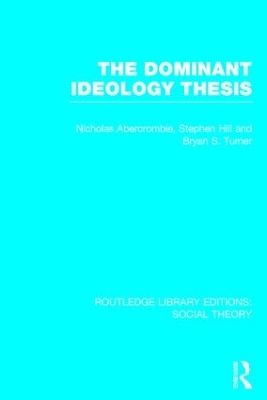Routledge Library Editions: Social Theory
6 total works
Sovereign Individuals of Capitalism
by Professor Bryan S Turner, Professor Nicholas Abercrombie, and Dr Stephen Hill
In this sequel to their acclaimed The Dominant Ideology Thesis, the authors develop their analysis of the social and cultural underpinnings of modern capitalism. They confront a central assumption of western culture: namely, that the individual is sovereign, and that capitalism above all other economic forms depends on individualism. These ideas have an unbroken history from Alexis de Tocqueville to Milton Friedman. The paradox of the modern world is that the moral emphasis on the individual is contradicted by the actual organization of economy and society.
The authors suggest that individualism and capitalism have no enduring or necessary relationship. Their linkage is entirely accidental and was confined to one particular historical period in the West. Against the background of what they term the Discovery of the Individual, the authors show how individualism gave capitalism a particular shape, and capitalism in turn highlighted the possessive features of the individual. Oriental capitalism and late capitalism in the West bear no particular relationship to individualism; indeed, they flourish best in the absence of individualistic culture. Collectivism increasingly dominates both economic and social life.
These issues once informed the sociological enterprise, but have not been systematically addressed in recent times. This book revives the classical tradition of the historical and comparative analysis of culture and economy in capitalist society, in the context of the late twentieth-century world.
Capital, Labour and the Middle Classes
by Professor John Urry and Professor Nicholas Abercrombie
Most recent sociological work on the theory of class is based on a distinction between Weberian and Marxist approaches. For the first part of this volume, the authors use this distinction to review the literature on the middle class, concentrating particularly on the traditions of Marxist theory and of the more empirical work inspired by Max Weber. They show, however, that this distinction is of limited utility in reconstructing a theory of the middle class.
The Dominant Ideology Thesis (RLE Social Theory)
by Professor Bryan S Turner, Nicholas Abercrombie, and Stephen Hill
As a radical critique of theoretical sociological orthodoxy, The Dominant Ideology Thesis has generated controversy since first publication. It has also been widely accepted, however, as a major critical appraisal of one central theoretical concern within modern Marxism and an important contribution to the current debate about the functions of ideology in social life.
Talcott Parsons on Economy and Society
by Professor Bryan S Turner and Robert J. Holton
Dominant Ideologies (RLE Social Theory)
by Professor Bryan S Turner, Nicholas Abercrombie, and Stephen Hill
In this volume leading international scholars elaborate upon the central issues of the analysis of ideology: the nature of dominant ideologies. The ways in which ideologies are transmitted; their effects on dominant and subordinate social classes in different societies; the contrast between individualistic and collectivist belief systems; and the diversity of cultural forms that coexist within the capitalist form of economic organization.
This book is distinctive in its empirical and comparative approach to the study of the economic and cultural basis of social order, and in the wide range of societies that it covers. Japan, Germany and the USA constitute the core of the modern global economy, and have widely differing historical roots and cultural traditions. Argentina and Australia are white settler societies on the periphery of the capitalist world-system and as a result have certain common features, that are cut across in turn by social and political developments peculiar to each. Britain after a decade of Thatcherism is an interesting test of the efficacy of an ideological project designed to change the cultural values of a population. Poland shows the limitations of the imposition of a state socialist ideology, and the cultural complexities that result.
In this study of politics in capitalist society Bryan Turner explores the development of citizenship as a way of demonstrating the effective use of political institutions by the working class and other subordinate groups to promote their interests. Marxist criticisms of reformism are rejected; it is shown that subordinate groups can achieve significant advances in social and economic rights, and that democracy is not a sham but a necessary mechanism for the pursuit of interests.




